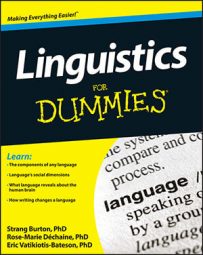Many linguists are academics — studying languages for their own sake — but a lot of others work for government organizations, including the military, or for nonprofits documenting and revitalizing languages. Still others work for corporations that use linguistics to solve technical problems.
Linguists explore all areas of human language. Some of the major branches of linguistics include:
Anthropological linguistics: Looks at how language and culture are connected.
Language acquisition: The process by which kids learn a first language or older folks learn a second language. Learning two languages at the same time from childhood is called bilingual language acquisition.
Historical linguistics: The study of the origins and evolution of language, especially the study of how languages change over time.
Language revitalization: The process of bringing languages that are no longer widely spoken back to life. Linguists don’t revitalize languages on their own, but they work closely with communities who seek to revitalize their languages.
Language typology: The study of the systematic patterns that are found in the languages of the world.
Morphology: The study of how meaningful parts of words combine with each other.
Neurolinguistics: The study of how language is related to brain function.
Phonetics: The study of what sounds the speakers of a language use and how they make them.
Phonology: The study of how the sounds of a language systematically combine to form patterns.
Pragmatics: The study of how language is used in interactive contexts such as conversation, email, and teaching.
Semantics: The study of how meaning is expressed through language.
Sociolinguistics: The study of how the form of language varies across different social contexts.
Speech perception: The process of perceiving speech sounds.
Speech production: You got it — the process of producing speech sounds.
Syntax: The study of how words and phrases combine to form sentences.

